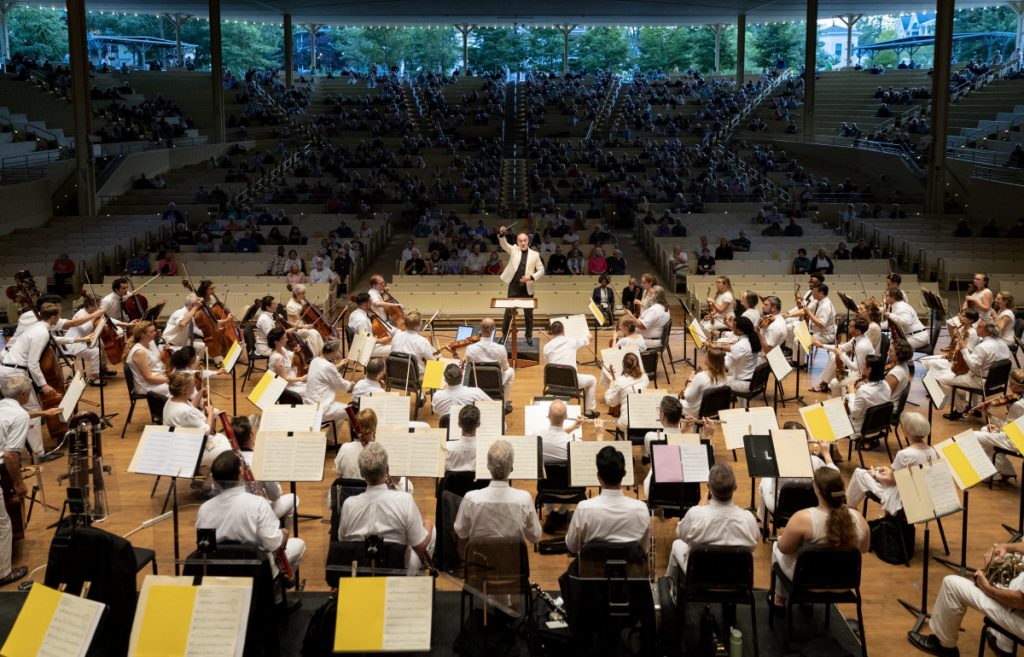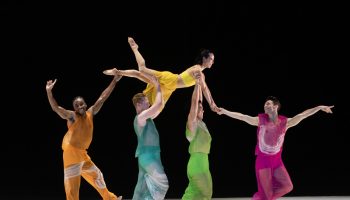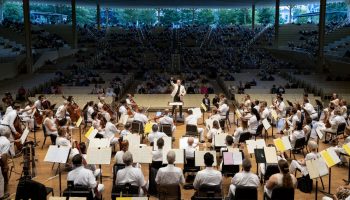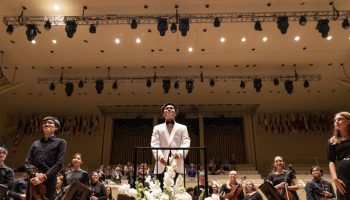
Sarah Russo
Staff writer
Music is a universal language that can speak to anyone, from any background or of any age. Children can be moved by music even if they don’t know why — but it also doesn’t hurt if that music reminds them of a funny cartoon or animal.
Laura Savia, vice president of performing and visual arts, said the Chautauqua Symphony Orchestra will “share classical music of the highest caliber in a way that is fun and accessible to all” with its upcoming program.
“(It) will bring the story to life in a way that is fun for kids and kids at heart,” she said.
The CSO will perform two beloved classics, Sergei Prokofiev’s Peter and the Wolf and Gioachino Rossini’s “William Tell Overture,” at 2:30 p.m. Sunday in the Amphitheater under the baton of Music Director and Principal Symphonic Conductor Rossen Milanov.
Audiences of all ages are sure to enjoy the program, Savia said — she has her own fond memories to use as an example.
“I remember seeing Peter and the Wolf performed as a kid and running around for days afterward, singing melodies from the piece and acting out parts of the story,” Savia said. “I hope there are some kids at this concert — perhaps my own daughter — who will have that experience.”
Further enhancing that experience, acclaimed Broadway actor Brandon Dirden will perform the role of the narrator.
Serving as an acting instructor for the Chautauqua Theater Company this season, Dirden is an associate arts professor in the Graduate Acting Department at New York University’s Tisch School of the Arts.
“Prokofiev is one of the great orchestral composers of all time,” Savia said. “This narration enhances the story at the heart of this piece, while celebrating his music.”
The 30-minute musical fairy tale, written in 1936, tells the story of a young boy’s adventures with animals. Each character is portrayed by different instruments: Young Peter in the sound of the strings, his grandfather in the bassoon, the wolf through the horns and more.
Musically, Peter and the Wolf shows how humanity and nature live in harmony. The adversary — the wolf — is defeated, but not killed, in the piece’s optimistic ending.
The group of heroes working together to defeat the wolf are a part of the enduring example of Socialist Realism, an officially sanctioned composition style developed and championed in the Soviet Union between 1932 and 1988.
Prokofiev himself called the piece an “experiment,” according to socialist news outlet People’s World.
“In Russia today, there is a great emphasis on the musical education of children,” Prokofiev later said. “Children get an impression of several instruments of the orchestra just by hearing the piece performed.”
Featuring similar lively representations, the “William Tell Overture” is considered one of the most recognizable classical music pieces.
From the animated antics of Bugs Bunny and Mickey Mouse to the film soundtrack “Princess Diaries 2” and TV commercials for Reebok and Honda, the final section of the overture is frequently used to enhance visual action and adventure.
“The ‘William Tell Overture’ is immediately recognizable from classic cartoons,” Savia said. “It is a timeless piece that seems to put a smile on people’s faces.”
Composed in 1829 as part of an opera based on the Swiss legend of William Tell, the overture’s story follows a man who must demonstrate his loyalty to the ruling Austrian authorities by shooting an apple off his son’s head with a crossbow.
Rossini was inspired by the dramatic tension of the story and the epic nature of the Swiss landscape. The 12-minute piece consists of four distinct parts, each with a different tempo and mood.
The first section has become known as the Prelude or “Dawn,” featuring a slow and peaceful melody to represent the sunrise over the Swiss Alps. “The Storm” comes in the fast and chaotic second section. Next, “the Call to the Cows” is lively and cheerful, representing the return of livestock from the fields to the village. Finally, the most famous portion, “March of the Swiss Soldiers,” is a fast, triumphant piece representing the Swiss victory over the Austrian oppressors.
“It will be an absolute delight to hear it performed live by a full orchestra,” Savia said.




